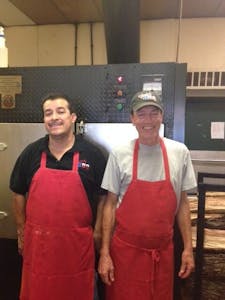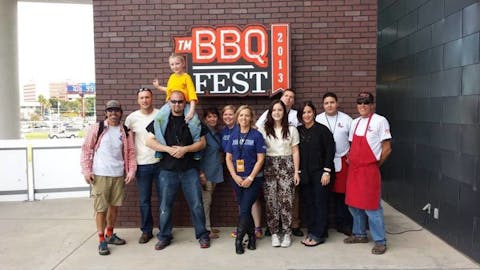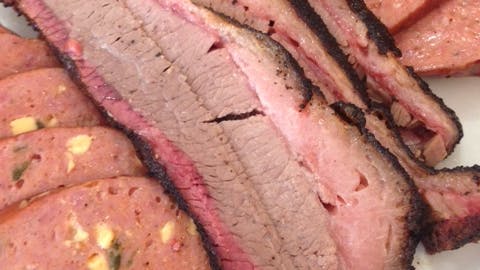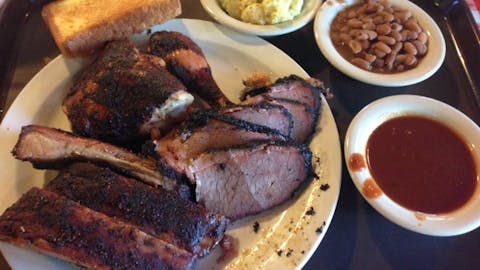 Owner/Pitmaster: Cousins BBQ; Opened 1983
Owner/Pitmaster: Cousins BBQ; Opened 1983
Age: 59
Smoker: Wood-fired Rotisserie Smoker
Wood: Hickory & Pecan
As the name suggests, Cousins BBQ is about family. Calvin “Bootsie” Payne III opened the place on McCart Avenue in Fort Worth in 1983 along with his wife and three of his children. His son Cliff Payne has been in charge of the barbecue since they opened the doors, and you can still find him working at the McCart location most days, which is where we talked.
Bootsie got started in the dog food business before a stint in a couple seafood restaurants. A Star Telegram article from last year noted where his interest in barbecue began. “He became friendly with the Jetton family, and began traveling with Walter Jetton, a Fort Worth barbecue king who catered for President Lyndon Johnson at the White House and at LBJ Ranch. Mr. Payne fell in love with the business because of his travels with Jetton.” After overseeing the family business for three decades, Bootsie passed away last year.
Cousins is still flourishing. It made the Texas Monthly Top 50 in 2008 and again last year. The accolades are based primarily on the sliced brisket, but make sure you ask for it the way Cliff likes it – with a little fat left on.
Daniel Vaughn: Let’s talk brisket.
Cliff Payne: As we know, brisket is going up because so many people across the country are getting into this business. I did a flow chart. The price increased more this year since January 2nd than we’ve averaged for our first fourteen years in business. That’s just the price increase over the last eight months.
DV: What are you paying for raw briskets?
CP: This week is was up to $3.38, but we’ve been up to $3.58. We use Sterling Silver which is the upper third of Choice. It’s a nine to eleven pound brisket. They’re hard to get. I waited two years in line to get this product.
DV: What are you charging per pound for brisket?
CP: $16, and we’re running a 56% food cost for that [33% is average for restaurants]. At that rate we’re losing money.
DV: Is that food cost percentage just for brisket?
CP: Brisket is the only one.
DV: How much brisket do you go through between all the stores?
CP: We got through about 14,000 pounds per week. It was a lot higher, but we’re focused so much on other proteins that we’ve gotten people away from just brisket.
DV: Do you just hope that people start buying the pork shoulder?
CP: Yeah. We’re moving it a little bit here, but it’s the airport where we’re sending two hundred pounds a day, ready to go.
DV: How does that compare to brisket?
CP: With sliced and chopped combined, we’re still selling more pork [at the airport]. That shows how many people are coming from the east. It’s kind of our saving grace right now.
DV: You talked about the airport location, but how many Cousins locations are out there?
CP: Right now we have five. We just shut down Terminal B for renovation. We’ll have to rebid it in a year. We’ve got some thinking to do about staying at the airport. For all the effort we put in at the airport…we’ve been there ten years and we wanted four locations at the airport. We’re down now to Terminal D and a kiosk in B. CNN Travel named us the number three food in the United States in an airport. Of course it’s not as hard in the airports to do it better than anyone else.
DV: Have you seen your business affected since Salt Lick opened in the airport?
CP: At the international terminal we were the highest volume per square foot of any restaurant or retailer at the airport for eight years. Everything the airport has asked us to do we have done. We were fighting for Terminal A where Salt Lick is now. Competition’s great. It keeps everybody on their toes.
DV: How does the business at the airport compare to this location?
CP: This store is the flagship. You’ve been out here. You can see the neighborhood’s changing. We’ve got our obstacles. It’s like going to the Bishop Arts District. Certain people love to go there and others don’t. At this location, we’re moving up five or six percent this year. The only store we can’t get going is Alliance. We over estimated our name out there, then not having pits… We can get away with that at the airport, but they wouldn’t let us put a pit in there.
DV: Where is that barbecue cooked?
CP: This store feeds the airport and Alliance. Bryant Irving and Crowley are on their own.
DV: The sliced brisket here is usually served from the lean end. Do you prefer lean or fatty brisket?
CP: There’s probably something in the DNA. I grew up in a time when everything was cooked at home and we didn’t go out to eat. Dad wasn’t making a lot of money, and five kids, so. There was a restaurant over on the east side, Jimmy’s Barbecue. It’s been gone a long time. I was five or six and we went there. Everything was cut just like they do at Franklin. They cut right through the brisket without trimming the fat. I remember that day so clearly eating that brisket and thinking “this is the best thing I’ve ever had.” I’ve always had a thing for fat. At home when we’re eating steak like ribeyes I eat everybody’s fat.
DV: It doesn’t show.
CP: My wife says “life is not fair. I can look at that and gain a pound.” I’ve got a lot of energy burning inside me.
DV: Do you still get out and eat anyone else’s barbecue?
CP: I don’t get out and eat barbecue. The only barbecue I got was because mom and dad brought it to me. I’m embarrassed for anybody to see me at another restaurant, so I just don’t do it anymore.
DV: Your dad Boots started the business in 1983. What did he do before cooking barbecue?
CP: He started out in the dog food business. My dad and granddad had Payne’s Dog Food in the forties, fifties and early sixties. This was back before everything went corporate. There were more independents. When the Safeways and Tom Thumbs came along you had to pay shelf allowances and pay for advertising. They didn’t have that and eventually the Purinas and those guys took us down in business. I was ten years old when I started working there. I was upstairs taking cans out of boxes and putting them on a rail. They sold out in 1966 and dad was trying to figure out what to do. There was a seafood restaurant named Zuider Zee. We bought a franchise and moved to San Antonio in 1967. My dad had a little catering experience with Jetton’s, but as far as running a restaurant he had no experience. It was three hundred twenty seats and a seventy seat bar. He goes from working with three men in dog food to a hundred twenty employees at a restaurant. Dad worked hundred hour weeks, and he did that for three years. How many men can do that? I understand the passion for wanting to do something, but there are so many things out there in the world to see. We all ended up in the business and some things didn’t work out. It built a lot of character is us, but I wish we didn’t have the character for as hard as it was for the family at that time.
DV: What did you do then?
CP: We kinda knew the seafood business and there was a Zuider Zee in Lubbock. We moved to buy it and opened it under our name Captain’s Galley. We had it going pretty good, then Red Lobster moved down the street, and boom. Two years and we were out of business. This is our forty-seventh year in the restaurant business. Anybody who talks to me about getting into this business I’ll tell them to go spend their money on something else. They better divorce their wife and don’t have any kids. If you’re getting into it because you think it’s fun or you want to make money…It’s gotta be a passion for good food. This business it about building relationships too. The business isn’t just getting them in the door. You have to exceed expectations. Customer service is the easiest part. Smoking meat is an art form with the variables in humidity, your wood type, and where the brisket came from. All these things affect it every day.
DV: How did the family get from Captain’s Galley in Lubbock to Cousins BBQ in Fort Worth?
CP: The writing was on the wall in Lubbock. We weren’t going to survive. People think this business is tough, but the seafood business is a lot harder. You have product coming in from all over the world. If that lobster tail is not completely right, all of sudden that twenty ounce rock Australian lobster tail just turns to mush. Even back then we were paying over twenty dollars a pound for those things. Anyway, my sister went to work for Bigham’s BBQ in Lubbock. The owner of Bigham’s heard we were selling the restaurant and moving back to Fort Worth. He asked us to come work for him. At that time, Lubbock had some good barbecue. We thought we had it figured out when we came here, and what little we did know we learned from Bigham’s.

DV: You opened in this location, correct? What year was that?
CP: Yes. We opened in 1983. The barbecue for the first few years was pretty bad. I learned at Bigham’s that it was alright as long as it didn’t bleed. We were slicing it so thin it was almost sushi. We’re doing our deal and some of the old guys would tell it like it is. They’d say “go down to Angelo’s and over to Gaylen’s and try their barbecue. Come back here and try to duplicate that.” I started looking around and I realized that ours did suck.
DV: How long did it take to improve the barbecue?
CP: To what I understand as good now? Probably seven or eight years.
DV: Who was cooking the barbecue back then?
CP: I was. I ran the kitchen until ’95.
DV: Did your dad just leave the cooking to you from the beginning?
CP: My dad was a genius. He would motivate me. I’d bring him a rib and ask him what he thought. He’d say “It’s good, but is it your best?” I’d tell him “that’s my best.” But then I’d stew on it and realize I could do it better. That’s how he motivated.
DV: Did you just cook then, or did you work the front of house too?
CP: I cut on the block too. When I used to work the block on Friday and Saturday night I’d work a split, and my break was from 2:00 to 4:00. As I would sit home on break I’d start getting in that zone like you would for basketball or golf. I was trying to get my head ready so I’d be on my A-game. I’d go in the backyard and smoke cigarettes, it’s one of my stupidities, and I’d get ready for it. It was a big show for me. I’d have my knives razor sharp. You could cut sushi with them. They were dangerous. I’d get here and go four hours as hard as I could, and the adrenaline rush for that would take me to 1:00 or 2:00 in the morning. I lived for that.
DV: What was on the menu when you first opened?
CP: The last thing we added was turkey and we added that ten years ago. We used Gooch sausage in Abilene for the first ten years. We found out they were going bankrupt. My brother-in-law Oliver came over form Germany and taught us the basics of sausage. My best friend, Rick Fitzgerald, is one of the most knowledgeable people in Texas in smoked meats. He showed us the rest of the way to make our own sausage. Ours is good quality.
DV: Where is it made?
CP: Right here. We don’t use any frozen trimmings or anything.
DV: Did you work here at Cousins from day one?
CP: It was mom, dad, me, my sister Corby, and my youngest brother Craig. We did that for two years. Jeff and Mark came in later. At one time we had twenty-two family members working in this building.
DV: How long did you run this single location before adding another?
CP: Cityview opened in 2000. We just had so much family.
DV: I see that happening to some other joints here recently in Texas. They have family members who deserve to be in management positions, so they open another store to give them the opportunity.
CP: I’d tell them just to keep the one location and build it bigger and better. Being on the front lines for forty something years takes a lot out of you. It’s a lot of fun and very rewarding, but that at the end of the day sometimes you just want to go home and sit in a closet. I read that write-up you did on Roy Perez and he talked about how mean Rick Schmidt was. They probably say that about me here, but if you’re not moving forward, you’re moving backwards. I’m directing the ship here, and somebody’s gotta be looking out for where the land is. You also have to stay humble. I’ve let the ego get me one time, and I’ve seen the destruction it caused. Back in the nineties we got EuroDisney. We were like Tim Love. We had something in the paper every week. I let my ego get away from me. In ’91 or ’92 I thought all the hard work was paying off. I woke up one day and said “I gotta get rid of this damn ego and get to work.”
A video of the current barbecue restaurant at Disneyland Paris
DV: How did that deal get started for you?
CP: Sometimes it’s about who you know. My dad was friends with the Bass’s financial advisor. The Basses owned a majority of the Disney stock at that time. We got a contract for two years. At one point I had a master chef and two executive chefs working in my kitchen. We were training them. We went over to Europe and trained them for a month. For the grand opening we had 2500 kilos [5500 lbs] of baby back ribs to cook in a day and a half in one J&R 1300 smoker. We worked forty-two hours straight cooking all those ribs. I don’t know many people who can work forty-two hours straight. I don’t remember if I ate, but I drank espresso all day long. I’d never had it before, but I was drinking twenty or thirty a day. It was crazy. It’s the biggest attraction in Europe. The barbecue and Mexican food – you couldn’t get into those restaurants. We provided food for Buffalo Bill’s Wild West show. We served 2300 people twice per night. It was ninety-five euros for adults and sixty-five for kids for barbecue and a show. Those tickets were sold out for a year.
DV: Did you have any other big restaurant deals like that?
CP: Colter’s was in bad shape. We had an opportunity to buy twelve Colter’s. I thought it was what I was waiting for. My dad told me to bring Richard [their financial advisor] in and see what he thinks. I already had my mind made up, but he said “if you take on twelve new units, this family will not be together in two or three years. You have this now, so keep what you have.” I wanted to do it, but we didn’t go for it. It was a smart decision.
DV: You talked about all the family members that once worked here. How many of your children work at Cousins?
CP: My daughter Shannon is the only one.
DV: How many other children do you have?
CP: One son and two other daughters.
DV: I’ve spoken with other barbecue joint owners and they seem to struggle between wanting their offspring to carry on the tradition versus the thought that they don’t wish the life they have on their children.
CP: Shannon loves this business, but the others were just doing it because they grew up with it. I didn’t want to see them continue like that. There are other ways. My youngest is a vegan and my two middle ones are vegetarians. My daughter-in-law is a vegetarian too. I’ve got great kids. I was here all the time, and my wife was great. She was on the creativity side. You can have all the knowledge in the world, but you need creativity.
DV: How many more years do you plan to work here?
CP: If I stop and go sit at home, I’ll be gone in two years. If I can get in the car and get over here, I’ll keep coming as long as my mind doesn’t get any crazier.









